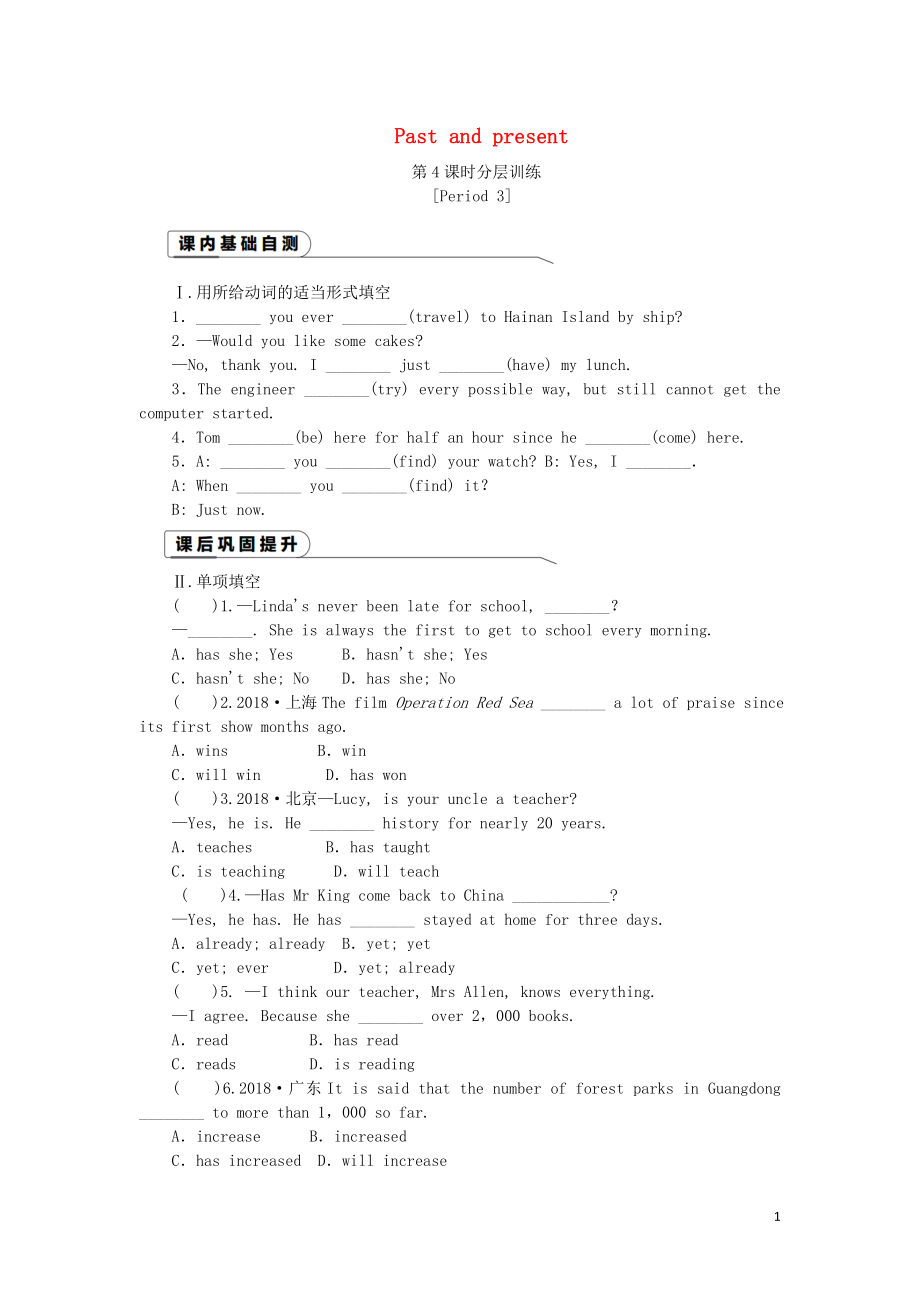《2019年八年級(jí)英語(yǔ)下冊(cè) Unit 1 Past and present(第4課時(shí))Period 3分層訓(xùn)練 (新版)牛津版》由會(huì)員分享��,可在線閱讀,更多相關(guān)《2019年八年級(jí)英語(yǔ)下冊(cè) Unit 1 Past and present(第4課時(shí))Period 3分層訓(xùn)練 (新版)牛津版(3頁(yè)珍藏版)》請(qǐng)?jiān)谘b配圖網(wǎng)上搜索�。
1、Past and present
第4課時(shí)分層訓(xùn)練
[Period 3]
Ⅰ.用所給動(dòng)詞的適當(dāng)形式填空
1.________ you ever ________(travel) to Hainan Island by ship?
2.—Would you like some cakes?
—No, thank you. I ________ just ________(have) my lunch.
3.The engineer ________(try) every possible way, but still cannot get the computer starte
2��、d.
4.Tom ________(be) here for half an hour since he ________(come) here.
5.A: ________ you ________(find) your watch? B: Yes, I ________.
A: When ________ you ________(find) it���?
B: Just now.
Ⅱ.單項(xiàng)填空
( )1.—Linda's never been late for school, ________���?
—________. She is always the first to
3、get to school every morning.
A.has she; Yes B.hasn't she; Yes
C.hasn't she; No D.has she; No
( )2.2018·上海The film Operation Red Sea ________ a lot of praise since its first show months ago.
A.wins B.win
C.will win D.has won
( )3.2018·北京—Lucy, is your uncle a teacher
4���、?
—Yes, he is. He ________ history for nearly 20 years.
A.teaches B.has taught
C.is teaching D.will teach
( )4.—Has Mr King come back to China ____________?
—Yes, he has. He has ________ stayed at home for three days.
A.a(chǎn)lready; already B.yet; yet
C.yet; ever D.yet; alr
5�、eady
( )5. —I think our teacher, Mrs Allen, knows everything.
—I agree. Because she ________ over 2�,000 books.
A.read B.has read
C.reads D.is reading
( )6.2018·廣東It is said that the number of forest parks in Guangdong ________ to more than 1���,000 so far.
A.increase B.inc
6����、reased
C.has increased D.will increase
( )7.2018·河北I ________ an invitation to the concert. I can't wait to go.
A.receive B.will receive
C.was receiving D.have received
( )8.—Where is your mother, Jack?
—She ________ the library.
A.has gone to B.have gone to
C.have been to
7�����、 D.has been to
Ⅲ.根據(jù)漢語(yǔ)意思完成句子
1.近幾年來(lái),在我們地區(qū)��,春天很快就變成了炎熱的夏天���。
In recent years, spring has quickly __________________ hot summer in our area.
2.她剛剛見(jiàn)過(guò)丹尼爾���。
She has __________________ Daniel.
3.我從未讀過(guò)這本書。
I have __________________ this book.
4.從早上八點(diǎn)鐘以后你吃過(guò)東西嗎���?
Have you __________________ anything _
8�、_____ 8 a.m.?
5.我還沒(méi)學(xué)會(huì)怎樣使用這部手機(jī)�����。
I ________________ how to use this mobile phone __________.
Ⅳ.句型轉(zhuǎn)換
1.The plane has already arrived. (改為一般疑問(wèn)句)
________ the plane ________ ________���?
2.John has lived in China for__nearly__20__years. (對(duì)畫線部分提問(wèn))
________ ________ ________ John lived in China?
3.
9���、Judy bought a new camera just now. (用just改寫句子)
Judy ________ just ________ a new camera.
4.Millie's mother has already cooked lunch. (改為否定句)
Millie's mother ________ ________ lunch ________.
5.Alice's penfriends have learned Chinese chess for 2 years. (改為同義句)
Two years has passed ________Ali
10、ce's pen-friends ________ learning Chinese chess.
教師詳解詳析
教師詳解詳析
【課時(shí)分層訓(xùn)練】
課內(nèi)基礎(chǔ)自測(cè)
Ⅰ.1.Have; travelled
2.have; had
3.has tried
4.has been; came
5.Have; found; have; did; find
課后鞏固提升
Ⅱ.1.D 考查現(xiàn)在完成時(shí)的反意疑問(wèn)句的構(gòu)成�。句意:“琳達(dá)上學(xué)從未遲到過(guò),是嗎���?”“是的����。她每天早上總是第一個(gè)到達(dá)學(xué)校?���!狈匆庖蓡?wèn)句的構(gòu)成方式:前否后肯;前肯后否���。ne
11����、ver表示否定�,故反意疑問(wèn)句應(yīng)該用肯定形式,排除B���,C�。根據(jù)答句句意可知��,琳達(dá)從未遲到過(guò)����,應(yīng)用“No”表示否定,但需譯為“是的”��。故選D��。
2.D
3. B 考查動(dòng)詞時(shí)態(tài)�����。根據(jù)時(shí)間狀語(yǔ)“for nearly 20 years”判斷句中使用現(xiàn)在完成時(shí)�����。故選B�����。
4.D yet一般用于否定句或疑問(wèn)句��,already一般用于肯定句��。故選D�。
5.B
6. C 考查動(dòng)詞時(shí)態(tài)。句意:據(jù)說(shuō)到目前為止廣東省的森林公園的數(shù)量已經(jīng)超過(guò)一千�。根據(jù)時(shí)間狀語(yǔ)“so far”可知應(yīng)用現(xiàn)在完成時(shí);the number of意為“……的數(shù)量”���,其后的謂語(yǔ)動(dòng)詞須用第三人稱單數(shù)形式�。故選C。
7.D 8.A
Ⅲ.1.turned into
2.just seen/met
3.never read
4.eaten; since
5.haven't learned; yet
Ⅳ.1. Has; arrived yet
2. How long has
3. has; bought
4. hasn't cooked; yet
5. since; began/started
3
 2019年八年級(jí)英語(yǔ)下冊(cè) Unit 1 Past and present(第4課時(shí))Period 3分層訓(xùn)練 (新版)牛津版
2019年八年級(jí)英語(yǔ)下冊(cè) Unit 1 Past and present(第4課時(shí))Period 3分層訓(xùn)練 (新版)牛津版

